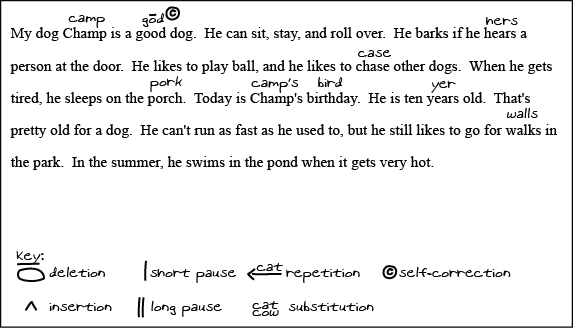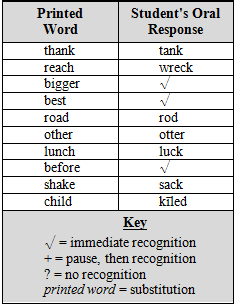Study Guide
Field 008: Reading Specialist
Sample Open-Response Item
The following materials contain:
- Sample test directions for the open-response item
- A sample open-response item
- An example of a strong response to the open-response item
- The scoring rubric
Sample Test Directions for Open-Response Items
This section of the test consists of two open-response item assignments. You will be asked to prepare a written response of approximately 150–300 words for each assignment. You should use your time to plan, write, review, and edit your response for each assignment. You must write responses to both of the assignments.
For each assignment, read the topic and directions carefully before you begin to work. Think about how you will organize your response.
As a whole, your response to each assignment must demonstrate an understanding of the knowledge of the field. In your response to each assignment, you are expected to demonstrate the depth of your understanding of the subject area by applying your knowledge rather than by merely reciting factual information.
Your response to each assignment will be evaluated based on the following criteria.
- PURPOSE: the extent to which the response achieves the purpose of the assignment
- SUBJECT KNOWLEDGE: appropriateness and accuracy in the application of subject knowledge
- SUPPORT: quality and relevance of supporting evidence
- RATIONALE: soundness of argument and degree of understanding of the subject area
The open-response item assignments are intended to assess subject knowledge. Your responses must be communicated clearly enough to permit valid judgment of the evaluation criteria by scorers. Your responses should be written for an audience of educators in this field. The final version of each response should conform to the conventions of edited American English. Your responses should be your original work, written in your own words, and not copied or paraphrased from some other work.
Be sure to write about the assigned topics. You may not use any reference materials during the test. Remember to review your work and make any changes you think will improve your responses.
Sample Open-Response Item
Objective 0020
Prepare an organized, developed analysis on a topic related to one or more of the following: reading processes and development; reading assessment; reading instruction; and/or the professional knowledge and roles of the Reading Specialist.
Use the information below to complete the exercise that follows.
A reading specialist is assessing the reading performance of a first-grade student named Derrick. Printed below are the results from two different assessments: (1) a record of Derrick's performance reading aloud a passage from a grade-appropriate text; and (2) a record of his performance reading aloud from a word list.
A reading passage with notes on the assessment of the students reading skills. Start sentence My dog champ is a good dog. End sentence. Champ was read camp and good was read god at first then self corrected by the student. Start sentence. He can sit stay and roll over. End sentence. Start sentence. He barks if he hears a person at the door. End sentence hears was read hers. Start sentence. He likes to play ball and he likes to chase other dogs. End sentence. Chase was read case. Start sentence. When he gets tired he sleeps on the porch. End sentence. Porch was read pork. Start sentence Today is Champ's birthday. End sentence. Champ's was read camp's and birthday was read bird. Start sentence. He is ten years old. End sentence. Years was read yer. Start sentence. That’s pretty old for a dog. End Sentence. Start Sentence. He can’t run as fast as he used to, but he still likes to go for walks in the park. End sentence. Walks was read walls. Start sentence. In the summer, he swims in the pond when it gets very hot. End Sentence.
A table with 2 columns. The left column is labeled printed word and the right column is labeled student's oral response. Beneath the 2 columns is a key explaining the entries in the right column. A check mark equals immediate recognition, a plus sign equals pause then recognition, a question mark equals no recognition, and a printed word equals substitution. Start. Printed Word thank, Student's Oral Response tank. Printed Word reach, Student's Oral Response wreck. Printed Word bigger, Student's Oral Response check mark. Printed Word best, Student's Oral Response check mark. Printed Word road, Student's Oral Response rod. Printed Word other, Student's Oral Response otter. Printed Word lunch, Student's Oral Response luck. Printed Word before, Student's Oral Response check mark. Printed Word shake, Student's Oral Response sack. Printed Word child, Student's Oral Response kiled. End.
Based on these assessment results, write a response in which you:
- identify two significant reading limitations Derrick demonstrates, citing specific evidence to support your conclusions;
- describe one instructional strategy you would use to address either or both of the reading limitations you have identified; and
- explain why this instructional strategy is likely to be effective in improving Derrick's reading.
Sample Strong Response to the Open-Response Item
The sample response below reflects a strong knowledge and understanding of the subject matter.
Derrick's reading of the passage and the list of words revealed that he is unfamiliar with some phonics patterns. These gaps resulted in some loss of meaning in some parts of the text. One area of word identification skills in particular that needs to be addressed directly with Derrick is consonant letters that make up one sound. Derrick missed the "ch" sound in both the reading and word list, using case for chase, luck for lunch, and pork for porch. "Sh" and "th" were also a problem. Another weakness he revealed was in the pattern of vowel spellings ("oa" in road, "ea" in hears and years).
One instructional strategy that would help Derrick in this area is to review phonics instruction of the /ch/ sound versus the /k/ sound that he is using. Word play of common words with combined consonants, such as a "Making Words" activity, and visual reminders in the classroom, such as a sign on a chair and a list of words beginning and ending with "ch", "sh", and "th" will improve his familiarity with this pattern. Direct instruction of the "ea" vowel spelling should be done with words that he can connect with, such as year, neat, each, leaf, etc. In addition, Derrick should be encouraged to notice when his reading of a word doesn't make sense in context.
Derrick will improve his word identification skills and his confidence in his abilities as a reader with this instruction. As he is exposed to print over a period of time, he should begin to read with more clarity and fluency.
Scoring Rubric
Performance Characteristics
The following characteristics guide the scoring of responses to the open-response item(s).
| Purpose | The extent to which the response achieves the purpose of the assignment. |
|---|---|
| Subject Matter Knowledge | Accuracy and appropriateness in the application of subject matter knowledge. |
| Support | Quality and relevance of supporting details. |
| Rationale | Soundness of argument and degree of understanding of the subject matter. |
Scoring Scale
The scoring scale below, which is related to the performance characteristics for the tests, is used by scorers in assigning scores to responses to the open-response item(s).
| Score Point | Score Point Description |
|---|---|
| 4 |
The "4" response reflects a thorough knowledge and understanding of the subject matter.
|
| 3 | The "3" response reflects an adequate knowledge and understanding of the subject matter.
|
| 2 | The "2" response reflects a limited knowledge and understanding of the subject matter.
|
| 1 | The "1" response reflects a weak knowledge and understanding of the subject matter.
|
| U | The response is unrelated to the assigned topic, illegible, primarily in a language other than English, not of sufficient length to score, or merely a repetition of the assignment. |
| B | There is no response to the assignment. |

